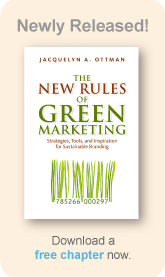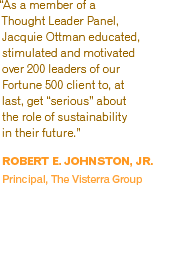The Real News About Green Consuming
By Jacquelyn A. Ottman
The Green Business Letter, May 2002
Eco-skeptics who read the March 6 article in the Wall Street Journal announcing, "'Green' Sales Pitch Isn't Moving Many Products" might be tempted to discredit the value of investment in new, environmentally preferable products and technologies. The risk: they will miss out on a potent new source of innovation and competitive advantage.
Contrary to what was reported, environmental appeals are actually growing in number–the Energy Star label, for example, now appears on 11,000 different companies' models in 38 product categories, from washing machines and light bulbs to skyscrapers and homes. The difference is, however, that green–rightfully so–is on the wane as as the primary sales pitch for products. But this doesn’t mean that American consumers don’t care about our environment-- or that they won't buy environmentally preferable products.
The Journal quotes research from Roper’s Green Gauge that a high percentage of consumers (42%) feel that environmental products don’t work as well as conventional ones. This is an unfortunate legacy from the 1970s when showerheads sputtered and natural detergents left clothes dingy. Given the choice, all but the greenest of customers will reach for the Tide-- a name they trust to get their clothes clean-- over the premium-priced, proverbial "Happy Planet" any day, including Earth Day. But this is beside the point.
The real news in today’s green marketplace is that thanks to new technology, many green products have greatly improved-- some to the point of true superiority over their conventional counterparts. Many can now attract users on the basis of cost, health and convenience–benefits that appeal to all consumers, and the reasons why consumers buy certain products in the first place.
That’s why Philips Lighting re-launched its Earth Light brand compact fluorescent light bulb under the Marathon brand, emphasizing long life and money savings. Contrary to the Journal article, the company did not "ditch the environmental angle." The U.S. EPA’s Energy Star label and claims of "Environmental Responsibility" still appear prominently on the package. In fact, Philips executives maintain that environmental benefits are critical to the success of the Marathon brand, which is growing 12% per year in an otherwise flat category.
Similarly, Toyota plays up the quiet ride of gas-electric hybrid Prius while underscoring the car’s ecological benefit, fuel efficiency–and consumers are lining up on waiting lists to get their hands on one. Meanwhile, Honda has introduced a hybrid version of the popular Civic, and this year's auto shows had U.S. car makers scrambling to produce hybrid prototypes to catch up.
Maytag, for its part, markets its fast selling, front-loading Neptune washer on the basis of its superior cleaning ability with water savings and energy efficiency as important secondary benefits. These are just the tip of the iceberg. This magazine is chockfull of hundreds of other examples.
We as Americans need to be aware that some of the most compelling innovations these days are coming from Europe and Japan, where ecologically conscious consumers, as well as government regulations and incentives like extended producer responsibility, have pushed companies to progress to the next generation of environmentally sound, high performance products.
Back in the U.S., Roper's Green Gauge tells us that the percentage of Americans who consider pollution to be a top concern reached an all-time high in 2000 and that 56% would do more for the environment if they only knew how. American consumers increasingly demand that environmental performance be a part of any successful product-- including Tide. Without more attention to these matters by domestic producers, companies like Ford and GE may find themselves several steps behind Toyota and Philips.
Just like market competitiveness, environmentalism is now embedded in the American culture. We have what it takes to create the next generation of products to honor both priorities.
We look forward to the day when "green" will be rightfully equated with "superior performance", and when we in the U.S. can fully embrace these new innovations to our economic benefit and the benefit of our environment.
©Copyright 2002 by J. Ottman Consulting, Inc.



 ShareThis
ShareThis
Jacquelyn Ottman is president of J. Ottman Consulting, Inc., a New York-based marketing consulting firm that specializes in helping businesses derive competitive advantage from eco-innovation and green marketing. She is the author of Green Marketing: Opportunity for Innovation, 2nd edition.
Contact Us to learn more about J. Ottman's green marketing services.
Follow Jacquie on Twitter
Read Jacquie Ottman's Green Marketing Blog
Copyright© 2008 by J. Ottman Consulting, Inc.


